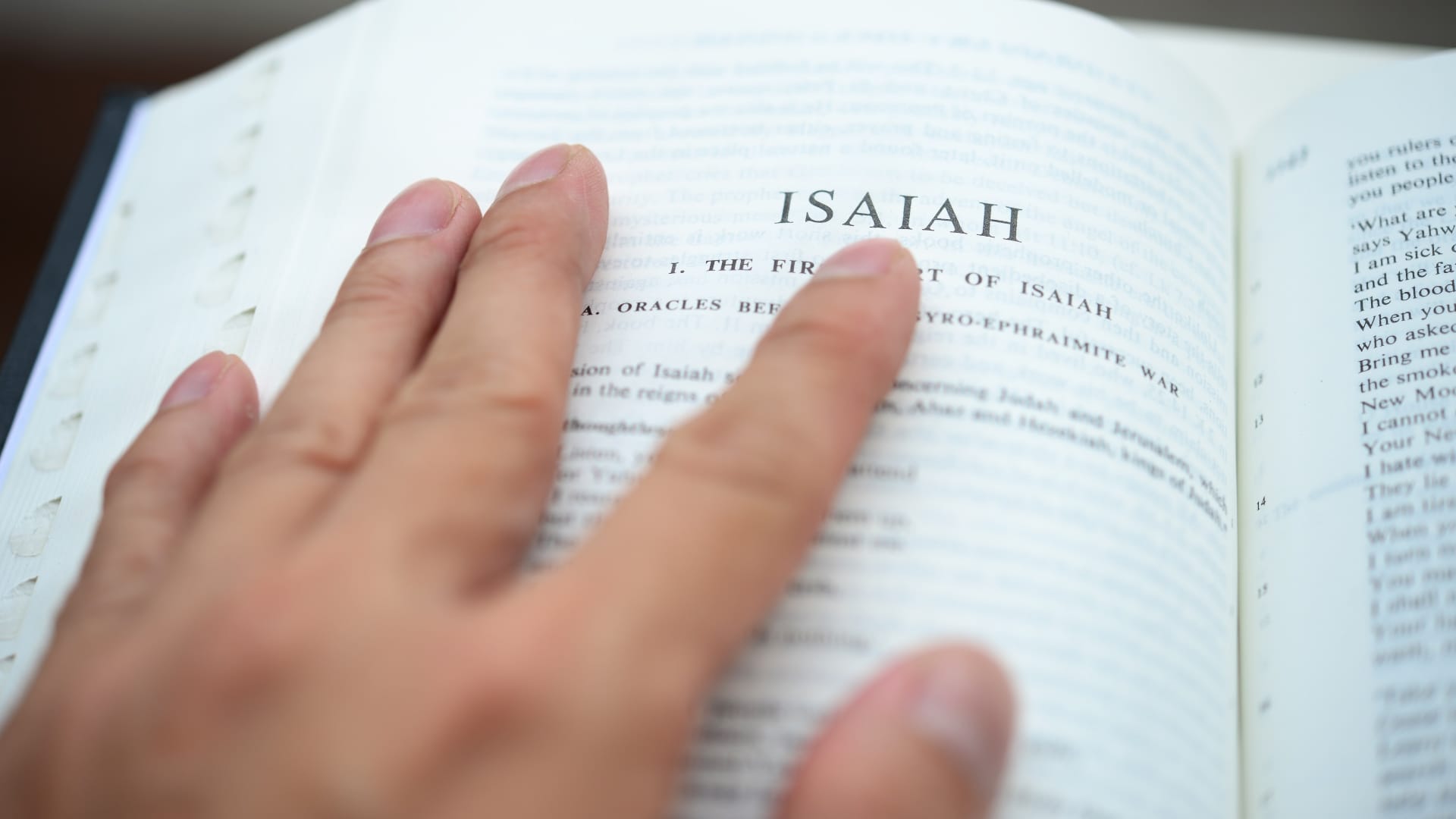Good News After Bad News (Isaiah 42:1-9)

Big Idea: Jesus will set the world right with gentleness and compassion.
You know about those times when somebody says, “I have good news for you and bad news for you. Which one do you want to hear first?”
Today’s passage is one of those times.
We are currently in an Advent series. Advent is a time of preparation for the first and second coming of Christ.It's a time when the church has historically focused on the Old Testament promises about Jesus' coming. Last week we began by looking at the earliest prophecy of Jesus in Genesis. Today we’ve fast-forwarded centuries as we look at one of many prophecies of the coming of Jesus in Isaiah.
The Bad News
I’m going to have good news for you in a minute, but let’s start with the bad news. Israel has sinned. Isaiah chapters 1 to 39 mostly contain bad news. Isaiah accused Israel of abandoning God, and promised God’s judgment for their sin. The bad news is very bad.
We all need to grapple with this bad news. Here’s the truth about us. We’ve all sinned. We all deserve God’s judgment. I don’t think anyone has put it better than this confession that we sometimes read:
We confess that we have sinned against you in thought, word, and deed, by what we have done, and by what we have left undone. We have not loved you with our whole heart; we have not loved our neighbors as ourselves.
That’s where we need to start. It explains so much about us and about the world. We’ve sinned against a holy God and we deserve his judgment.
The Good News
That’s the bad news. Do you want the good news? Here it is: God promised to send a servant who would deal with our sin problem.
Isaiah 42:1 says:
Behold my servant, whom I uphold,
my chosen, in whom my soul delights;
I have put my Spirit upon him;
he will bring forth justice to the nations.
This is the first of four servant songs found in Isaiah. Something significant changes. After a lot of bad news, there is very good news, because, as we’ll see, this servant will change everything.
Okay, but who is this servant?
There are a few theories. One is that the servant is Israel itself. I think there’s an element of truth to this. God was calling Israel to become his faithful servant. But this theory falls short, because Israel never did measure up. The servant of these four songs is the embodiment of all that Israel should be but isn’t. He is God’s perfect servant.
So who is this servant, then? He is a real person who is God’s answer to their failure.
What is he like? This passage tells us. It highlights what he will do and how he will do it.
First: The servant will set the world right.
Notice how often the word justice comes up in verses 1-4:
I have put my Spirit upon him;
he will bring forth justice to the nations.
He will not cry aloud or lift up his voice,
or make it heard in the street;
a bruised reed he will not break,
and a faintly burning wick he will not quench;
he will faithfully bring forth justice.
He will not grow faint or be discouraged
till he has established justice in the earth;
and the coastlands wait for his law.
What does this word justice mean? Ray Ortlund writes:
He’s thinking of more than legal correctness. This word is used in Exodus 26:30 of the plan for the tabernacle, the blueprint God revealed from Heaven. In an analogous way, God has a blueprint for human existence. He knows how human beings and human society can be at their best. He knows how to make us happy and fulfilled. And through his servant Jesus he’s bringing his plan down from Heaven, to reorder human civilization in a beautiful way. God’s kingdom will come, and his will will be done on earth as it is in Heaven, and we were made for it.
This word translated “justice” includes within its scope all our longings for a better life and a better world.
Here’s what he’s talking about.
Five or six years ago, it really looked like the world was getting better. I thought there were problems, but it seemed like we were making progress in solving some of the world’s problems.
In the past couple of years, we’ve seen that the world is more of a mess than any of us thought. That part’s not a surprise. We’ve always faced issues of racism, sex trafficking, and injustice. What seems especially fresh these days is the realization that we can’t fix any of it. No matter how hard we try, we just keep making a bigger mess of things. The world’s so dysfunctional, “so far advanced, so systemic, so overwhelming, it’s beyond our powers of correction” (Ortlund). We can’t fix things because we’re part of the problem. Even our best efforts fall short of what needs to happen.
This doesn’t mean we shouldn’t work to make this world a better place. It does mean that our efforts will always fall short. The problems are so big, and we are so sinful, that we’ll never be able to fix the problems of the world.
That’s where this prophecy comes in.
What we’ve failed to do through thousand of years of history, this servant will do. He will, as Ortlund days, “reorder human civilization not by bullying but by suffering, not by imposing demands on us but by absorbing our sins and miseries into himself.”
If you are sick of the brokenness of this world, this is very good news. Turn your eyes to this servant. He’s the one we need to set this world right. It will never be just without him.
That’s very good news, but that’s not all. Here’s the second thing this servant will do.
Second: The servant will be gentle and compassionate.
Look again at verses 2 and 3:
He will not cry aloud or lift up his voice,
or make it heard in the street;
a bruised reed he will not break,
and a faintly burning wick he will not quench;
he will faithfully bring forth justice.
How will this servant operate?
He will be gentle, not overbearing. He won’t overpower us. Not only that, but he’ll be compassionate. A bruised reed is half-broken and ready to be thrown out. A faintly burning wick smokes, and it may seem like it’s not worth very much. But as long there’s even a glimmer of hope, he won’t give up on us.
As Tim Keller says, “Jesus Christ, this Servant, is attracted to hopeless cases. He loves the fragile. He loves people who are beaten and who are battered and who are bruised and maybe don’t show it on the outside, but inside, they’re dying. He knows what to do with them. Over and over and over again, the Bible says (like Psalm 147 or Isaiah 61) he binds up the brokenhearted, and he heals their wounds.”
Centuries ago, a man wrote a whole book on the image of the bruised reed. His name was Richard Sibbes. Listen to what he said:
Art thou bruised? Be of good comfort, he calleth thee; conceal not thy wounds, open all before him, keep not Satan’s counsel. Go to Christ though trembling; as the poor woman, if we can but “touch the hem of his garment” (Matt. 9:20), we shall be healed and have a gracious answer.
And then look at what God says to this servant in verses 6 and 7:
I am the LORD; I have called you in righteousness;
I will take you by the hand and keep you;
I will give you as a covenant for the people,
a light for the nations,
to open the eyes that are blind,
to bring out the prisoners from the dungeon,
from the prison those who sit in darkness.
Not only is this servant gentle and compassionate, but he will open blind eyes, free captives, and release those who sit in darkness. “In short, the Servant will undo all the horrendous and degrading effects that sin has had on the human race and restore to people their true freedom and dignity as sons and daughters of God” (Barry Webb).
Not only will this servant set the world right, but he will do so with gentleness and compassion.
If you haven’t guessed yet, the servant that Isaiah talks about in this passage is Jesus. This is a passage that helps us understand who Jesus is, and why we should long for his coming.
Friends, this is good news that we all need. This is good news of God’s healing, saving work.
What this means is that we can come to him. There isn’t much safety in the world. It’s hard to be honest about our brokenness. We worry that if we show any weakness that we’ll get crushed. We don’t have to worry about that with Jesus. He will never break you. We don’t have anything to fear.
We can come to Jesus with all our hurts, all of our sins, all of our guilt, and know that he will set this world right with gentleness and compassion. He will establish justice. He will welcome anyone — the neediest, the most hopeless case. Jesus turns no-one away.
Here’s the bad news: we’ve sinned. We deserve God’s judgment.
Here’s the good news: Jesus will set the world right with gentleness and compassion. Jesus welcomes sinners like us.
Lord, thank you for this picture of Jesus. Thank you for what he will do. Set this world to what it should be. Thank you for how he will do it: with gentleness and compassion. May we all come to him today knowing that he will turn none of us away. In Jesus’ name we pray. Amen.





